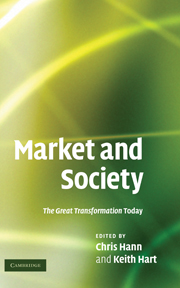Book contents
- Frontmatter
- Contents
- List of figures and table
- List of contributors
- 1 Introduction: Learning from Polanyi 1
- 2 Necessity or contingency: Mutuality and market
- 3 The great transformation of embeddedness: Karl Polanyi and the new economic sociology
- 4 The critique of the economic point of view: Karl Polanyi and the Durkheimians
- 5 Toward an alternative economy: Reconsidering the market, money, and value
- 6 Money in the making of world society
- 7 Debt, violence, and impersonal markets: Polanyian meditations
- 8 Whatever happened to householding?
- 9 Contesting The Great Transformation: Work in comparative perspective
- 10 “Sociological Marxism” in central India: Polanyi, Gramsci, and the case of the unions
- 11 Composites, fictions, and risk: toward an ethnography of price
- 12 Illusions of freedom: Polanyi and the third sector
- 13 Market and economy in environmental conservation in Jamaica
- 14 Embedded socialism? Land, labor, and money in eastern Xinjiang
- 15 Afterword: Learning from Polanyi 2
- Bibliography
- Index
12 - Illusions of freedom: Polanyi and the third sector
Published online by Cambridge University Press: 08 August 2009
- Frontmatter
- Contents
- List of figures and table
- List of contributors
- 1 Introduction: Learning from Polanyi 1
- 2 Necessity or contingency: Mutuality and market
- 3 The great transformation of embeddedness: Karl Polanyi and the new economic sociology
- 4 The critique of the economic point of view: Karl Polanyi and the Durkheimians
- 5 Toward an alternative economy: Reconsidering the market, money, and value
- 6 Money in the making of world society
- 7 Debt, violence, and impersonal markets: Polanyian meditations
- 8 Whatever happened to householding?
- 9 Contesting The Great Transformation: Work in comparative perspective
- 10 “Sociological Marxism” in central India: Polanyi, Gramsci, and the case of the unions
- 11 Composites, fictions, and risk: toward an ethnography of price
- 12 Illusions of freedom: Polanyi and the third sector
- 13 Market and economy in environmental conservation in Jamaica
- 14 Embedded socialism? Land, labor, and money in eastern Xinjiang
- 15 Afterword: Learning from Polanyi 2
- Bibliography
- Index
Summary
Introduction
This chapter is concerned with understanding the recent prominence of the third sector in British public policy and the light such an analysis sheds over neoliberalism's current form. Through two ethnographic studies of community recycling schemes I examine the divergence between the public rhetoric of freeing society from statist intervention and the practice of entangling third-sector groups into contractual relationships with the state. I suggest that not only do market principles mould how government now operates, but that the autonomy of the third sector is being eroded as it becomes little more than an instrument of the state, providing “public” services of welfare and environmental concern while internalizing the risks of operation. Polanyi helps us to locate and understand the process of treating “the economy” as something quite separate from human relations. What the ethnography here indicates is that, in the guise of re-invigorating social institutions as extensions of household values, the reach of market principles has, in fact, expanded to shape both state and society. The good citizen is now defined by an ability and desire to engage in the mainstream market as producer and consumer. The nature of the good state is more ambiguous.
In brief, my argument is this. The question of welfare is central to understanding changing relationships between society, the state, and the economy.
- Type
- Chapter
- Information
- Market and SocietyThe Great Transformation Today, pp. 221 - 239Publisher: Cambridge University PressPrint publication year: 2009
- 4
- Cited by

